| "We rob from the rich and we sell it to the poor at half price." |
| Jumbo |
Note: Small Time and Where's the Money Ronnie! are given equal billing on the cover of this release and were shown together as a double feature during its theatrical run in 1996. However, for the purposes of this review, Where's the Money Ronnie! will be treated as an extra, and is discussed separately below.
What's the difference between Robin of Locksley and Jumbo of Sneinton? On the face of it, surprisingly, not a great deal. Both are local heroes. Both are leaders of a loyal band of men and both seek to right the social injustice of rich men remaining rich, whilst poor men grow poorer by the second. The points where Robin and Jumbo diverge to become diferent men and present different kinds of masculinity are the surprisingly profound issues central to Shane Meadows' debut feature-length film, Small Time (or Smalltime to use its original onscreen spelling).
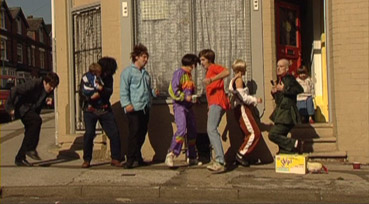
Jumbo (Shane Meadows, complete with wig) is the leader of a local gang, petty criminals, who are always on the lookout for the next job. At his side are best friend and next door neighbour Malc (Mat Hand, who also appears as Benny in Where's the Money Ronnie!), fence Lenny (Tim Cunningham), washed-up musician Willy (Jimmy Hynd, another Ronnie alumnus in a rather amusing Brian May-inspired wig), Bets (Leon Hammond), and Lenny's mute brother, Mad Terry (Dominic Dillon), who drives the gang around in his rusting Leyland van. Back at home, Jumbo and Malc's long-suffering girlfriends Ruby (Gena Kawecka) and Kate (Dena Smiles) look after their young children and keep each other company as they wait for the boys to return, wondering when their next scam will be the last – everything selling palettes of dog food, stealing from car boot sales or buying up boxes of trainers to sell on in the pub. All of them are cogs in Jumbo's machine, but not all of them are happy. Malc has grown tired of their hand-to-mouth existence and after a series of rows with Kate, he promises to try and break free. When he begins to widen his social circle thanks to Kate and her college friend Martin (Mark Rowlands), Malc sees it might possible for them to make a new life for themselves outside of Sneinton and Jumbo's shadow. Meanwhile, the gang are planning their biggest job yet.
Though Jumbo and his boys are all about making cash fast, their creator Meadows is very much a man who works hard for his money. In truth, this film is something closer to Meadows' twenty-first film, and is the culmination of two years of work on short films with much the same actors and crew, all due to go their separate ways after the project completed. Then 24, and working for Intermedia Film and Video in Nottingham, Meadows wrote the script during lunch breaks, but found the process a difficult one, opting instead to improvise the scenes instead. With his own funds running out, he approached the BFI for assistance. After seeing ten minutes of the film and the earlier short Where's the Money Ronnie! (also included in this release), then Head of Sales, Dee Emerson bought both, and Meadows rag-tag thieves found themselves shown on a much bigger stage at the London Film Festival in 1996. At the time at least, you could argue that Emerson was taking a risk, but with the gift of 20/20 hindsight, Emerson's decision to give the Meadows the break he so obviously needed, just looks like a solid bet, a lucky lightning strike, marking the humble beginnings of Meadows' filmic Midas streak, which would reach new heights a decade later with This is England.
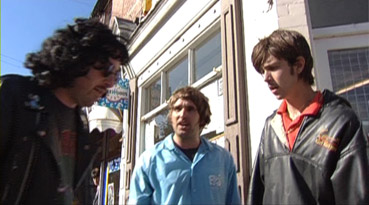
But, don't be fooled, this isn't a director who had it easy. He's put in the hours, he's plied his trade, and he's just as driven and as passionate about filmmaking as Malc is about making a new life for his wife and children. Of course, I can't say with any certainty that Meadows' ambitions are connected to bettering himself, but I do think they're about expressing himself, his world and his ideas in a very particular way.
There's no doubt that Small Time is a Shane Meadows film. They all have an instantly recognisable identity and this one is no different.
Given its relative shortness compared to those that would follow it, you'd be forgiven for thinking that plot and or characterisation are either rushed or conversely, undeveloped. If you wanted to be pedantic, then yes, the narrative begins to lose momentum a little towards the end of its runtime and some of the characters are more developed than others, but such issues are endemic within any film that contains an ensemble cast, not just this one. The director packs a great deal into just 71 minutes, and certainly goes along at a fair pace. Since Meadows has little leeway for exposition, we jump straight in to the action. It's almost as if we crash land into the lives of Jumbo and the boys, bump into them on the street or perhaps move next door. The handheld camera though obviously a necessity here rather than a stylistic statement works well, and gives the film an energy and zest right from the opening frames. When the narrative warrants it, things do slow down, with wider shots, which give a sense space and scale. Quite literally, the gang are little fish in a very big pond. Jumbo and his boys are people you could know; whether they live on your street or drink in your local. Yes, this lot are achingly provincial, and this film is all the better for it.
Although you can see this is a film made on a small budget (just £5,000), it has an integrity that the louder, pushier and glossier looking takes on gangland life proffered by Guy Ritchie and his contemporaries lack. This is no Lock, Stock and Two Smoking Barrels or any of the paler imitations that were part of the influx of Brit gangster films that arrived concurrent with Blair's 'Cool Britannia' and the Mod Revival, but it never wants or tries to be either. However, as anyone who's seen the director's other work will know, music is an important component, and is also a key part of establishing time, place and the group's social identity, but instead of opting for popular music, as Ritchie often does, Meadows rather cleverly eschewed any issues with potential budget swallowing music clearance by using an in-house band, connected to his production company, Big Arty (known simply as the Big Arty Band) to create the funk-infused soundtrack that recurs throughout the film. On the face of it, this many have been another choice born out of his limited means, but to my mind, it pays dividends, since it means Small Time negotiates (as all Meadows films do, regardless of music choices) the trap of feeling like one long music video, and also makes this film in particular feel somewhat more original and fully realised than if he'd gone the traditional big-name route. It's a neat little touch, and shows how important details are in Meadows' filmmaking.
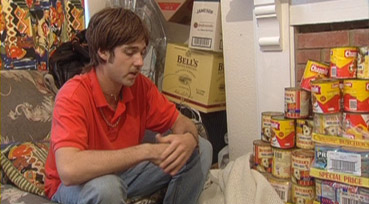
You'd be forgiven for thinking that this brightly coloured, brash little riot of a film has all the subtlety of a house brick, but you'd also be wrong. Central to Small Time's success in this area is the characterisation of Jumbo of and Malc, who are not only very different men, but they also represent different kinds of masculinity. Polar opposites in almost every respect, they make an odd couple, much like Romeo and Gavin A Room for Romeo Brass. It's so stretch to imagine that at some point in time, the rather gangly, mild-mannered Malc (he's very nearly a poster boy for the new man) could have been bullied into submission by the stockier, louder Jumbo (the epitome of thuggish lad culture), in the corner of their school playground when young. Their partnership, though based on trust and the brotherly love that grows from years of friendship, it's also one based fear. Malc not only fears what will happen to him if he leaves the relative safety of the gang, but it's also implied that he fears what Jumbo would do should he find out.
Whether by accident or design, Jumbo is Meadows' best character, and after Malc, he's the most fully drawn. But, like all Meadows men, he's a flawed. One moment he's amiable, laughing and joking with the boys holding court like a jester, and the next he's abusive and cruel, taking out his frustrations on girlfriend Ruby – sometimes verbally and sometimes physically. Where Malc is happy to be follow, Jumbo has to take the lead and have control over everyone and everything. However, everything isn't as clear cut as it first appears. Of course, Meadows is showing the spectrum of human behaviour in these men; after all, not everyone is the same. Men like Malc exist and men like Jumbo exist, but the manner in which their story arcs run in parallel is not just to flag up their differences but also their similarities. One particularly striking instance is Malc's reaction to Jumbo's abusive behaviour. Worried for her friend, Kate continually asks Malc to intervene and calm his friend down. Though he shares her concerns, he never does anything to come to Ruby's rescue. Kate obviously views this as a weakness, knowing that her boyfriend isn't strong enough to challenge Jumbo in any way, but, it's that same apathetic nature which allows and perpetuates Jumbo's behaviour to continue. Jumbo may look physically stronger than his friend, but in truth, he's the weaker man, taking his frustration out on Ruby, who's obviously less than equipped to deal with the fallout of his short temper, even after all these years.
The hidden complexity of Small Time comes in how we react to the gang – and Malc and Jumbo in particular – over the course of the film. By making these men so relatable and ordinary, you're amused by and feel affection for them. However, Meadows gives and takes with the same hand, since he forces us to reassess how we feel about these men when they do things that are less amusing, and the lines between right and wrong blur, raising the question whether we can still like or admire characters when they do unlikable things. In many ways, Jumbo's abusive nature is a test of sorts for issues he would revisit in Dead Man's Shoes, specifically the close relationship between empathy and hatred when revenge is thrown into the mix.

No character here is simply black or white, Meadows paints in shades and adds facets to them. Equally, Meadows never judges any of these people for who they are and what they do. It would be easy to step back and create distance, to occupy the moral high ground, but instead he does the reverse. The director never places himself outside of those behaviours, and therefore he's part of the fabric of this world, not just because he plays the role of Jumbo. By the same token, Small Time is also not a vanity project. As Jumbo, Meadows is unafraid of making himself look foolish, and indeed, whether scripted or improvised, the film actively encourages us to laugh with and at sometimes at these characters. A rather clever film without being smug, it sets up jokes and lets you enjoy them, feels natural rather than contrived. Of course, that balance comes from Meadows use of improvisation, which brings out some solid performances, especially from Mat Hand and Dena Smiles. This is why when the film does shift toward darker tones; it's an incredibly effective rather than jarring change, even at this early stage.
Small Time isn't a perfect film by any means, but it doesn't have to be either. However, it does show a great deal of promise, and is in many ways, the draft blueprint of what makes a Shane Meadows film, but also what makes it so successful: First, Meadows knows, and crucially, cares about his subject, Basic though this requirement might seem, it's not always a given and is rarely exercised with such skill, even at this early juncture in his career. Second, Meadows films not only show ordinary people, but revels in that ordinariness without apology.
If you want a clean, unified look and neatly tied-up storylines then this isn't a film for you. If you want something that's energetic, truthful, witty, and just a little bit of a rough diamond, then this is it.
Meadows' early films were shot on miniscule budgets on low-band digital video, possibly Hi-8 or at a pinch mini-DV, though I strongly suspect the former. The sort of format that we have to make excuses for when transferred to DVD, particularly in the days when 42" has become the new standard TV screen size. But despite some expected resolution limitations, the BFI have done a remarkable job with the transfer here and made the film look not only as good as it probably ever has, but better than some later Meadows films do on disc. The contrast balance and colour richness in particular surpass even optimistic expectations, and being video shot there are no dust spots or damage to deal with. The low resolution is visible on some picture elements and particularly on the credits, but on the whole this is as good a transfer as you could hope to see of the film.
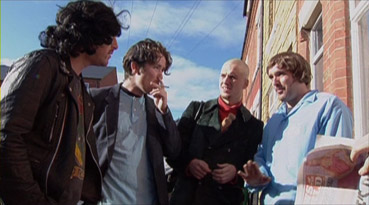
The transfer's second surprise is the Dolby stereo 2.0 soundtrack, which is way clearer than you'd expect for a low budget DV feature, with everything from dialogue to background sound and music being crisply reproduced.
The main draw here is Small Time, making its long overdue debut on DVD, but the added incentive of Where's the Money Ronnie! mean this release is a treat for any Meadows fan or an admirer of 1990s British cinema.
For those of you concerned with picture quality, be aware that while every effort has been made by the BFI to make these films look their best, remember, they're low budget productions filmed on analogue sources, so they'll never look as clear as our digitally-tuned eyes have come to expect. However, I'd argue that's no reason at all not to invest, and I see it as a pro, rather than a con. Aside from the fact it's nice to have Small Time and Ronnie exist on a disc at all, having grown up on VHS home entertainment, seeing that same kind of look on a DVD made me feel rather nostalgic, and perhaps other traditionalists out there will share my sentiments.
Where's the Money Ronnie! (12:21)
The first film to be produced by Maedows company, Big Arty, Where's the Money Ronnie! was made in June 1996 on a miniscule budget of £250 pounds, with most of the crew positions filled by Meadows himself – ranging from actor to soundman. This black and white film is the most famous of the director's early shorts.* Like Small Time, it's charmingly rough around the edges, this tale of four robbers Jock (Jimmy Hynd), Benny (Mat Hand), Zico (Paul Anderson) and Ronnie (Shane Meadows) who are interviewed by the police after a fight and a shooting.
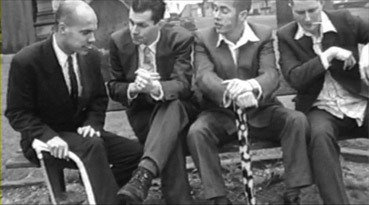
The film carries all the hallmarks he would later become known for, tested out in a smaller scale is very much a companion film to Small Time. The realist setting, the smattering of violence and the ever-present thread of humour make for a potent mix, and also showcase a great deal of promise, hinting at the heights he would reach in a decade later in This is England and Dead Man's Shoes. Of course, the flashback nature and open-ended structure – exactly who's telling the truth and where the gang's ill gotten gains disappeared to is left open to interpretation – immediately call to mind Akira Kurosawa's Rashomon and Bryan Singer's The Usual Suspects (with a slight nod toward Quentin Tarantino's Reservoir Dogs into the bargain) and while it's definitely in debt to both, don't be fooled, since this isn't a formulaic carbon copy compendium and it's rather easy to play 'spot the film reference' and read meaning into something which isn't actually present. What's more, Ronnie is certainly clever enough to stand on its own, and could teach the budget obsessed Hollywood a thing or two about how to craft a simple, yet compelling story with next to nothing at your disposal thanks to a meticulous eye for detail and a keen ear for dialogue.
Film Notes and Credits
Along with credits for Small Time, there are relatively brief yet comprehensive notes for it and Ronnie. Written by Jonny Bugg, these cover a lot of ground in a relatively short space, focussing focus mainly on the nuts-and-bolts of production with some references to the style, characterisation of, and common themes in, Meadows' work. This is a nice inclusion for anyone discovering his early work for the first time thanks to This is England '86, but for those already well-versed in all things Shane, there's probably little you won't already know.
That said, they certainly round things out and make it a worthy release on its own terms, rather than something riding the coattails of its more widely known predecessors. Indeed, their very success means that earlier features such as this – which often get lost amidst a large output – get their chance to shine.
Shane Meadows' feature-length debut, Small Time, is a surprisingly assured film. Though it might not look as good as its bigger-budgeted peers, its pace, humour and honesty are enough to outdo them all. If you're a Meadows fan, then this will be a long-awaited purchase, if you're only familiar with his work because of his later success, then give this one a try. You won't be disappointed.
*Ronnie exists in a number of unreleased versions, which vary from 10-15 minutes in length. More information on these can be found http://www.shanemeadows.co.uk/ in the 'Shorts' section.
|